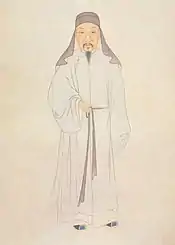Gu Yanwu
Gu Yanwu (Chinese: 顧炎武) (July 15, 1613 – February 15, 1682), also known as Gu Tinglin (Chinese: 顧亭林), was a Chinese philologist, geographer, and famous scholar-official in Qing dynasty. He spent his youth during the Manchu conquest of China in anti-Manchu activities after the Ming dynasty had been overthrown. He never served the Qing dynasty. Instead, he traveled throughout the country and devoted himself to studies.
Gu Yanwu | |||||||||||||||||||||||
|---|---|---|---|---|---|---|---|---|---|---|---|---|---|---|---|---|---|---|---|---|---|---|---|
 | |||||||||||||||||||||||
| Born | Gu Jiang 顧绛 15 July 1613 | ||||||||||||||||||||||
| Died | 15 February 1682 (aged 68) | ||||||||||||||||||||||
| Other names | Gu Zhongqing 顧忠清 Gu Ningren 顧寧人 Lord Tinglin 亭林先生 | ||||||||||||||||||||||
| Occupation | Student of the Guozijian (1643) | ||||||||||||||||||||||
| Known for | One of the Five Great Qing scholars (Huang Zongxi, Fang Yizhi, Wang Fuzhi, Zhu Zhiyu) | ||||||||||||||||||||||
| Spouse | Lady Zhu | ||||||||||||||||||||||
| Parent(s) | Gu Tongying (father) Lady He (mother) | ||||||||||||||||||||||
| Relatives | Great grandfather: Gu Zhangzhi Nephew: Xu Qianxue, Xu Bingyi, Xu Yuanwen | ||||||||||||||||||||||
| Chinese name | |||||||||||||||||||||||
| Traditional Chinese | 顧炎武 | ||||||||||||||||||||||
| Simplified Chinese | 顾炎武 | ||||||||||||||||||||||
| |||||||||||||||||||||||
Biography

Gu, a native of Jiangsu, was born as Gu Jiang (simplified Chinese: 顾绛; traditional Chinese: 顧絳; pinyin: Gù Jiàng). Gu began his schooling at the age of 14. In the spring of 1645, Gu was recommended to be the position of Bingbu Siwu in the royal court at Nanjing. There he proposed many ideas. Unsatisfied with the royal court's organization, Gu resigned and returned to his hometown. In 1655, local officials laid charges against him and threw him into prison. He was released from prison with the help of a friend.
Inspired by Chen Di, who had demonstrated that the Old Chinese has its own phonological system, Gu divided the words of Old Chinese into 10 rhyme groups, the first one to do so. His positivist approach to a variety of disciplines, and his criticism of Neo-Confucianism had a huge influence on later scholars. His works include Yinxue Wushu (音學五書), Ri Zhi Lu (日知錄) and Zhao Yu Zhi (肇域志).
Along with Wang Fuzhi and Huang Zongxi, Gu was named as one of the most outstanding Confucian scholars of the late Ming and early Qing Dynasty.[1]
In 1682, while returning from a friend's home to Huaying, Gu fell from horseback and died the next day.[2]
Aphorism
"Everybody is responsible for the fate of the world" (Chinese: 天下興亡,匹夫有責; pinyin: tiān xià xīng wáng, pǐ fū yǒu zé)
Alternatively, The rise and fall of the nation concerns everyone; or Everyone bears responsibility for the prosperity of society.
Legacy
Gu is commemorated by Tinglin Park[3] and the Gu Yanwu Museum in Tinglin Park of Kunshan. In 2005, the Central Propaganda Department of China named the Gu Yanwu Museum located at Gu's former residence in Qiandeng town as a "national patriotism education base".[4]
Former residence of Gu Yanwu
The former residence of Gu Yanwu is located in Qiandeng town of Kunshan, a Ming dynasty complex with main hall, living quarter, a study and a garden. Gu Yanwu's grave is located in a quiet corner of the garden.


See also
References
- 顾炎武 [Gu Yanwu]. Guoxue (in Chinese). Beijing Culture Communication Company [北京国学时代文化传播]. Retrieved 2011-10-10.
- 顾炎武:天下兴亡,匹夫有责_网易新闻中心 [Gu Yanwu: the rise and fall of every man's duty]. 163 (in Chinese). 2006-12-29. Retrieved 2011-10-10.
- 历史悠久的亭林公园 [Historic Tinglin Park]. News Kunshan (in Chinese). China Telecom. 2010-10-10. Archived from the original on 2012-04-25. Retrieved 2011-10-26.
- "江苏省爱国主义教育示范基地" [Patriotism education bases in Jiangsu Province]. Xinhuanet. Xinhua. 2004-10-14. Archived from the original on October 22, 2014.
- 何九盈 [He Jiuying] (1995). 中囯古代语言学史 [A history of ancient Chinese linguistics] (in Chinese). Guangzhou: Guangdong jiaoyu chubanshe.
Further reading
- Peterson, Willard J. (1968). "The Life of Ku Yen-wu (1613-1682)". Harvard Journal of Asiatic Studies. 28: 114–156. doi:10.2307/2718597. ISSN 0073-0548. JSTOR 2718597.
- Peterson, Willard J. (1969). "The Life of Ku Yen-wu (1613-1682)". Harvard Journal of Asiatic Studies. 29: 201–247. doi:10.2307/2718835. ISSN 0073-0548. JSTOR 2718835.
- Johnston, Ian (2015-01-31). "Gu Yanwu: Translations of Letters, Poems and Essays". Cordite Poetry Review. Retrieved 2017-03-31.
- Ng, On Cho; Wang, Q. Edward (2005). Mirroring the Past: The Writing and Use of History in Imperial China. Honolulu: University of Hawaii Press. pp. 229–231. ISBN 978-0-8248-2913-1
- Hummel, Arthur W. Sr., ed. (1943). . Eminent Chinese of the Ch'ing Period. United States Government Printing Office.